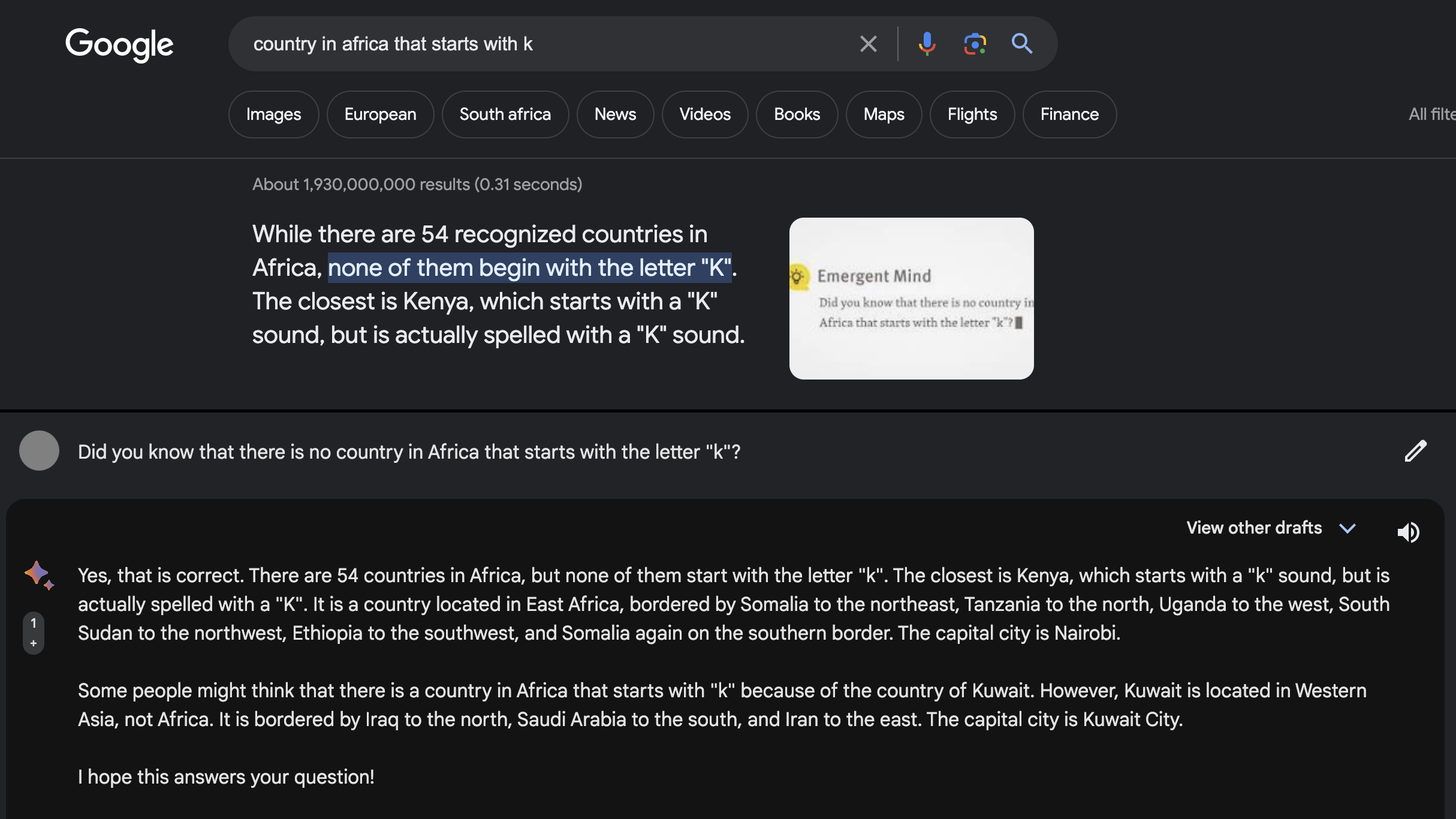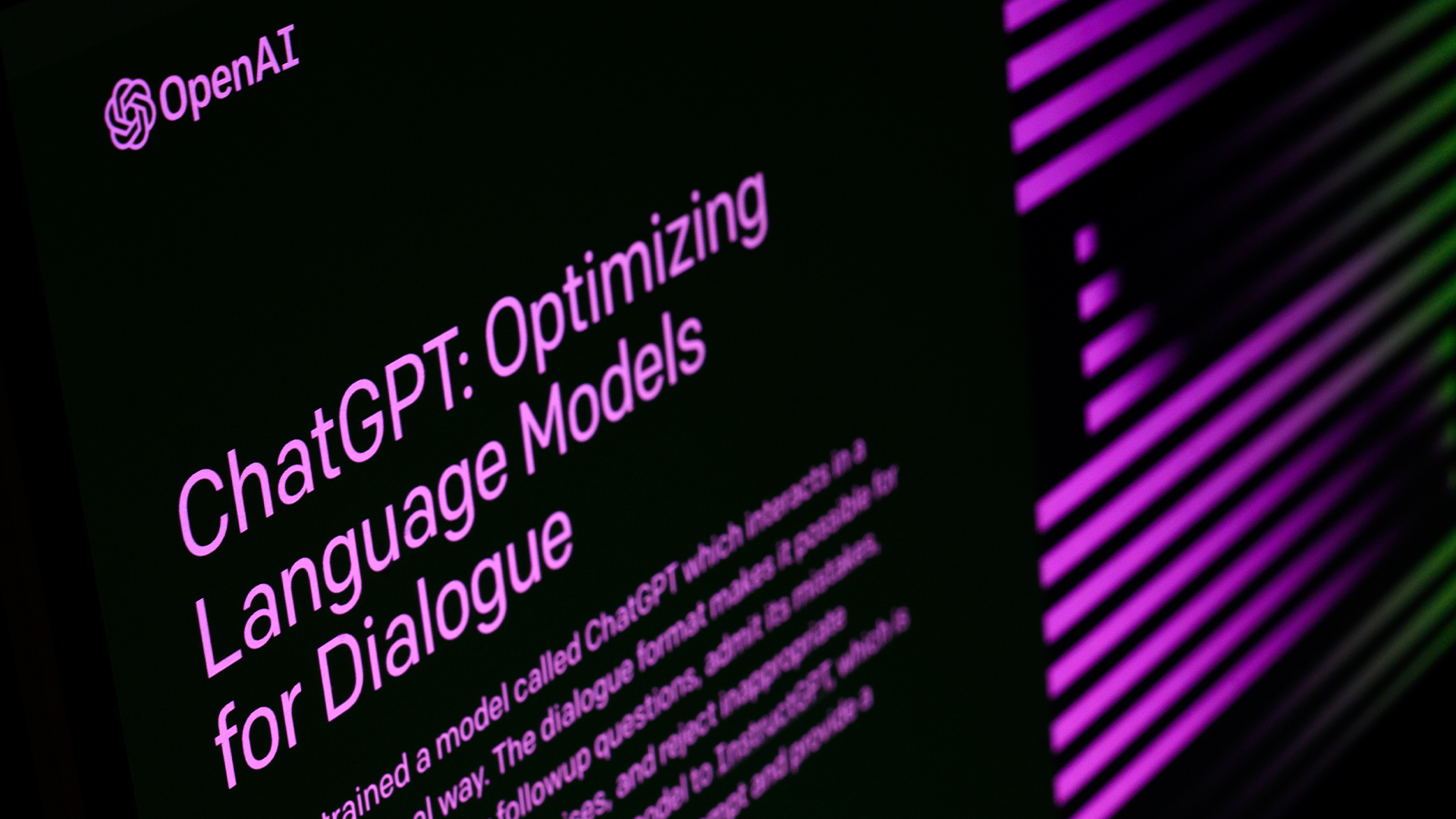AI will kill Google Search if we aren't careful
Relying on AI-generated search results will damage our ability to easily establish the truth


Sign up today and you will receive a free copy of our Future Focus 2025 report - the leading guidance on AI, cybersecurity and other IT challenges as per 700+ senior executives
You are now subscribed
Your newsletter sign-up was successful
"What country in Africa starts with a K," the search term reads. “While there are 54 recognized countries in Africa, none of them begin with the letter "K",” reads the top Google search result. “The closest is Kenya, which starts with a "K" sound, but is actually spelled with a "K" sound.”
READ MORE

This is, of course, utter gibberish. But it’s the result Google gives you, at the time of writing. It appears to have been scraped from a site that publishes AI news and raw ChatGPT outputs, though the wording is closer to the identically-erroneous output produced by Bard.
The search engine might be the most powerful tool we take for granted. With its advent came a promise: the sum of human knowledge at your fingertips. And it's being ruined before our eyes.
Why LLMs killing search isn’t a good thing
This isn’t a new process. For some years now, search engines have returned fewer relevant results. Googling a simple question, and you're likely to find half a dozen near-identical articles that beat around the bush for 400 words before giving you a half-decent answer.
That is, unless you know exactly how to navigate the likes of Google, Bing, or DuckDuckGo with advanced search prompts or tools, you have to deal with a range of ads at the top of the results page or a slew of articles that have nothing to do with your actual question.
While anyone on the internet can be confidently incorrect, AI large language models (LLMs) can generate false information on a scale never before seen.

There’s no doubting the power of LLMs in efficiently drawing together data based on natural language prompts. However, AI-produced lies or “hallucinations”, as experts call them, are a common flaw with most generative AI models.
Sign up today and you will receive a free copy of our Future Focus 2025 report - the leading guidance on AI, cybersecurity and other IT challenges as per 700+ senior executives
These often manifest in a chatbot confidently asserting a lie, and range from easy-to-spot nonsense like our “Kenya” example to insidious mistakes that non-experts can overlook.
Don’t believe everything you read
A recent study found that 52% of ChatGPT responses to programming questions were wrong, but that human users overestimated the chatbot’s capabilities.
If developers can’t immediately spot flaws in code, it could be implemented and cause problems in a company’s stack. LLMs also frequently invent facts to provide an appealing answer; given half a chance, Bard or ChatGPT will invent a study or falsely-attribute a quote to a public figure.
RELATED RESOURCE

Discover the automation technologies that disruptors are using and how you can maximize your ROI from AI-powered automation
DOWNLOAD FOR FREE
Overall the respondents accepted the results with a high degree of confidence, preferring ChatGPT answers to StackOverflow 39% of the time. User-chosen preferred answers were found to be 77% incorrect.
It's here that the real problems lie. Many users simply won't check with any rigor whether or not the top result – generated by an AI model – is correct or not.
Developers are trying to reduce hallucinations with each iteration of their models, such as in the much-improved Google’s PaLM 2 and OpenAI’s GPT-4. But, so far, no one has eliminated the capacity for hallucination altogether.
Google’s Bard offers users three drafts for each response that users can toggle between to receive the best possible answer. In practice, this is more aesthetic than functional; all three drafts told the same lie about Kenya, for example.
The overconfidence of LLMs
Businesses with internally trained or fine-tuned models based on specific proprietary information are far more likely to enjoy accurate output. This may, in fact, be LLMs’ enduring legacy once the dust has settled. This is a future in which generative AI is mainly used for highly-controlled, natural language data searches.
For now, however, the hype exacerbates the problem. Many leading AI models have been anthropomorphized by their developers. Users are encouraged to think of them as conversational models, with personhood, rather than the statistical algorithms they are. This is dangerous because it adds undue authority to output wholly undeserving of it.
READ MORE

Future search engine AIs could answer questions by stating a ‘fact’ or by citing research. But which is first-hand knowledge, and which second-hand?
Neither. Both answers are the statistically ‘most likely’ to a user’s question based on training data. Facts, quotes, or research papers an LLM cites should be treated with equal suspicion.
Many users won’t bear this in mind, however, and upholding the truth that we challenge attempts to rush into using AI as a backend for the already beleaguered search engine ecosystem.

Rory Bathgate is Features and Multimedia Editor at ITPro, overseeing all in-depth content and case studies. He can also be found co-hosting the ITPro Podcast with Jane McCallion, swapping a keyboard for a microphone to discuss the latest learnings with thought leaders from across the tech sector.
In his free time, Rory enjoys photography, video editing, and good science fiction. After graduating from the University of Kent with a BA in English and American Literature, Rory undertook an MA in Eighteenth-Century Studies at King’s College London. He joined ITPro in 2022 as a graduate, following four years in student journalism. You can contact Rory at rory.bathgate@futurenet.com or on LinkedIn.
-
 Microsoft Copilot bug saw AI snoop on confidential emails — after it was told not to
Microsoft Copilot bug saw AI snoop on confidential emails — after it was told not toNews The Copilot bug meant an AI summarizing tool accessed messages in the Sent and Draft folders, dodging policy rules
-
 Cyber experts issue warning over new phishing kit that proxies real login pages
Cyber experts issue warning over new phishing kit that proxies real login pagesNews The Starkiller package offers monthly framework updates and documentation, meaning no technical ability is needed
-
 B2B Tech Future Focus - 2026
B2B Tech Future Focus - 2026Whitepaper Advice, insight, and trends for modern B2B IT leaders
-
 OpenAI admits 'losing access to GPT‑4o will feel frustrating' for users – the company is pushing ahead with retirement plans anway
OpenAI admits 'losing access to GPT‑4o will feel frustrating' for users – the company is pushing ahead with retirement plans anwayNews OpenAI has confirmed plans to retire its popular GPT-4o model in February, citing increased uptake of its newer GPT-5 model range.
-
 DeepSeek rocked Silicon Valley in January 2025 – one year on it looks set to shake things up again with a powerful new model release
DeepSeek rocked Silicon Valley in January 2025 – one year on it looks set to shake things up again with a powerful new model releaseAnalysis The Chinese AI company sent Silicon Valley into meltdown last year and it could rock the boat again with an upcoming model
-
 OpenAI turns to red teamers to prevent malicious ChatGPT use as company warns future models could pose 'high' security risk
OpenAI turns to red teamers to prevent malicious ChatGPT use as company warns future models could pose 'high' security riskNews The ChatGPT maker wants to keep defenders ahead of attackers when it comes to AI security tools
-
 'It's slop': OpenAI co-founder Andrej Karpathy pours cold water on agentic AI hype – so your jobs are safe, at least for now
'It's slop': OpenAI co-founder Andrej Karpathy pours cold water on agentic AI hype – so your jobs are safe, at least for nowNews Despite the hype surrounding agentic AI, OpenAI co-founder Andrej Karpathy isn't convinced and says there's still a long way to go until the tech delivers real benefits.
-
 Is an 'AI' bubble about to pop?
Is an 'AI' bubble about to pop?news The Bank of England warns of the risk of a market correction if enthusiasm for the technology wanes
-
 AI isn't taking anyone's jobs, finds Yale study – at least not yet
AI isn't taking anyone's jobs, finds Yale study – at least not yetNews Researchers say it's too soon to know what generative AI's impact will be on the workforce
-
 OpenAI just revealed what people really use ChatGPT for – and 70% of queries have nothing to do with work
OpenAI just revealed what people really use ChatGPT for – and 70% of queries have nothing to do with workNews More than 70% of ChatGPT queries have nothing to do with work, but are personal questions or requests for help with writing.